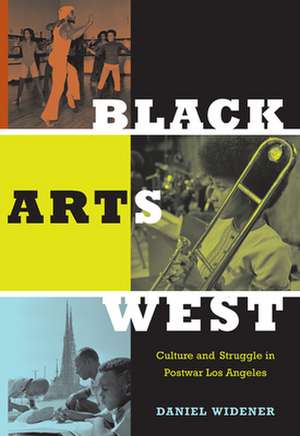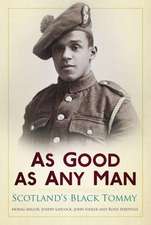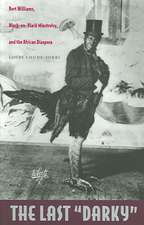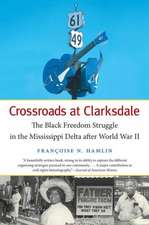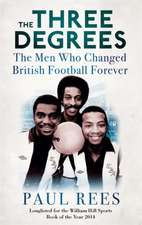Black Arts West – Culture and Struggle in Postwar Los Angeles
Autor Daniel Wideneren Limba Engleză Paperback – 7 mar 2010
Preț: 194.54 lei
Nou
Puncte Express: 292
Preț estimativ în valută:
37.22€ • 38.87$ • 30.74£
37.22€ • 38.87$ • 30.74£
Carte disponibilă
Livrare economică 25 martie-08 aprilie
Preluare comenzi: 021 569.72.76
Specificații
ISBN-13: 9780822346791
ISBN-10: 0822346796
Pagini: 384
Ilustrații: 48 illustrations
Dimensiuni: 155 x 232 x 24 mm
Greutate: 0.57 kg
Editura: MD – Duke University Press
ISBN-10: 0822346796
Pagini: 384
Ilustrații: 48 illustrations
Dimensiuni: 155 x 232 x 24 mm
Greutate: 0.57 kg
Editura: MD – Duke University Press
Recenzii
Daniel Wideners study provides a much needed, basic analysis of the complex and turbulent black arts and culture scene in Los Angeles during the 1960s and 1970s, and the dynamic mix of politics that fueled it.--Amiri Baraka
Black Arts West knocked my socks off. Daniel Wideners exciting account of the Watts Renaissance fundamentally revises our picture of contemporary L.A. art and literary scenes, and adds a crucial new chapter to the history of Black cultural radicalism during the 1960s and 1970s.--Mike Davis, author of City of Quartz: Excavating the Future in Los Angeles
[An] often-dazzling and truly interdisciplinary study. . . . What truly dazzles about Widener's book is its range of concerns and competencies: music, theater, visual arts, film, literature, social history, intellectual history, urban studies, politics, and on and on. . . . Black Arts West is an often-brilliant, certainly essential study for anyone interested in the black arts movement and, indeed, late twentieth-century U.S. Cultural politics. James Edward Smethurst, Journal of American History
. . . [B]y complicating our understanding of the black arts movement, Black Arts West makes a significant contribution to the history of art and activism in Los Angeles and highlights the city as a landscape of possibility upon which deeply meaningful cultural battles can be fought.Sarah Schrank, Left History
Black Arts West is as much a work in American intellectual and social history as it is in African American cultural and political history. . . . [It] would be well-suited for an upper-division elective in African American Studies or American Studies as it uses an interdisciplinary approach to study African American history. . . . Widener's book is convincing and engaging. . . .Jamie J. Wilson, The History Teacher
This is an ambitious, far-reaching, and original work that explores the meaning and importance of black culture from the postWWII years through the Bradley years and successfully argues for the centrality of culture to African Americans search for freedom. It is a book that should be read by scholars and students of African American history, cultural history, and the history of Los Angeles.Robert Bauman, Western Historical Quarterly
The invitation of Black Arts West is to allow the reader a historic and discursive remapping of black Los Angeles so that among the ashes and debris of its most sensational and destructive momentsthe Watts Riots of 1965 and the Rodney King Uprising of 1992we see a much more complex, dynamic, and affirmative network of creative activities that date back to the influx of blacks to this region during the Second World War. Not only does he offer a remapping of the region, but also he argues that a particular aesthetic emerged as a result of the deliberate efforts of black artists to move forward by staying put in Los Angeles. Nicole R. Fleetwood, Art Journal
"Daniel Widener's study provides a much needed, basic analysis of the complex and turbulent black arts and culture scene in Los Angeles during the 1960s and 1970s, and the dynamic mix of politics that fueled it."--Amiri Baraka "Black Arts West knocked my socks off. Daniel Widener's exciting account of the 'Watts Renaissance' fundamentally revises our picture of contemporary L.A. art and literary scenes, and adds a crucial new chapter to the history of Black cultural radicalism during the 1960s and 1970s."--Mike Davis, author of City of Quartz: Excavating the Future in Los Angeles "[An] often-dazzling and truly interdisciplinary study... What truly dazzles about Widener's book is its range of concerns and competencies: music, theater, visual arts, film, literature, social history, intellectual history, urban studies, politics, and on and on... Black Arts West is an often-brilliant, certainly essential study for anyone interested in the black arts movement and, indeed, late twentieth-century U.S. Cultural politics. " - James Edward Smethurst, Journal of American History "... [B]y complicating our understanding of the black arts movement, Black Arts West makes a significant contribution to the history of art and activism in Los Angeles and highlights the city as a landscape of possibility upon which deeply meaningful cultural battles can be fought." - Sarah Schrank, Left History "Black Arts West is as much a work in American intellectual and social history as it is in African American cultural and political history... [It] would be well-suited for an upper-division elective in African American Studies or American Studies as it uses an interdisciplinary approach to study African American history... Widener's book is convincing and engaging..." - Jamie J. Wilson, The History Teacher "This is an ambitious, far-reaching, and original work that explores the meaning and importance of black culture from the post-WWII years through the Bradley years and successfully argues for the centrality of culture to African Americans' search for freedom. It is a book that should be read by scholars and students of African American history, cultural history, and the history of Los Angeles." - Robert Bauman, Western Historical Quarterly "The invitation of Black Arts West is to allow the reader a historic and discursive remapping of black Los Angeles so that among the ashes and debris of its most sensational and destructive moments - the Watts Riots of 1965 and the Rodney King Uprising of 1992 - we see a much more complex, dynamic, and affirmative network of creative activities that date back to the influx of blacks to this region during the Second World War. Not only does he offer a remapping of the region, but also he argues that a particular aesthetic emerged as a result of the deliberate efforts of black artists to move forward by staying put in Los Angeles." - Nicole R. Fleetwood, Art Journal
Black Arts West knocked my socks off. Daniel Wideners exciting account of the Watts Renaissance fundamentally revises our picture of contemporary L.A. art and literary scenes, and adds a crucial new chapter to the history of Black cultural radicalism during the 1960s and 1970s.--Mike Davis, author of City of Quartz: Excavating the Future in Los Angeles
[An] often-dazzling and truly interdisciplinary study. . . . What truly dazzles about Widener's book is its range of concerns and competencies: music, theater, visual arts, film, literature, social history, intellectual history, urban studies, politics, and on and on. . . . Black Arts West is an often-brilliant, certainly essential study for anyone interested in the black arts movement and, indeed, late twentieth-century U.S. Cultural politics. James Edward Smethurst, Journal of American History
. . . [B]y complicating our understanding of the black arts movement, Black Arts West makes a significant contribution to the history of art and activism in Los Angeles and highlights the city as a landscape of possibility upon which deeply meaningful cultural battles can be fought.Sarah Schrank, Left History
Black Arts West is as much a work in American intellectual and social history as it is in African American cultural and political history. . . . [It] would be well-suited for an upper-division elective in African American Studies or American Studies as it uses an interdisciplinary approach to study African American history. . . . Widener's book is convincing and engaging. . . .Jamie J. Wilson, The History Teacher
This is an ambitious, far-reaching, and original work that explores the meaning and importance of black culture from the postWWII years through the Bradley years and successfully argues for the centrality of culture to African Americans search for freedom. It is a book that should be read by scholars and students of African American history, cultural history, and the history of Los Angeles.Robert Bauman, Western Historical Quarterly
The invitation of Black Arts West is to allow the reader a historic and discursive remapping of black Los Angeles so that among the ashes and debris of its most sensational and destructive momentsthe Watts Riots of 1965 and the Rodney King Uprising of 1992we see a much more complex, dynamic, and affirmative network of creative activities that date back to the influx of blacks to this region during the Second World War. Not only does he offer a remapping of the region, but also he argues that a particular aesthetic emerged as a result of the deliberate efforts of black artists to move forward by staying put in Los Angeles. Nicole R. Fleetwood, Art Journal
"Daniel Widener's study provides a much needed, basic analysis of the complex and turbulent black arts and culture scene in Los Angeles during the 1960s and 1970s, and the dynamic mix of politics that fueled it."--Amiri Baraka "Black Arts West knocked my socks off. Daniel Widener's exciting account of the 'Watts Renaissance' fundamentally revises our picture of contemporary L.A. art and literary scenes, and adds a crucial new chapter to the history of Black cultural radicalism during the 1960s and 1970s."--Mike Davis, author of City of Quartz: Excavating the Future in Los Angeles "[An] often-dazzling and truly interdisciplinary study... What truly dazzles about Widener's book is its range of concerns and competencies: music, theater, visual arts, film, literature, social history, intellectual history, urban studies, politics, and on and on... Black Arts West is an often-brilliant, certainly essential study for anyone interested in the black arts movement and, indeed, late twentieth-century U.S. Cultural politics. " - James Edward Smethurst, Journal of American History "... [B]y complicating our understanding of the black arts movement, Black Arts West makes a significant contribution to the history of art and activism in Los Angeles and highlights the city as a landscape of possibility upon which deeply meaningful cultural battles can be fought." - Sarah Schrank, Left History "Black Arts West is as much a work in American intellectual and social history as it is in African American cultural and political history... [It] would be well-suited for an upper-division elective in African American Studies or American Studies as it uses an interdisciplinary approach to study African American history... Widener's book is convincing and engaging..." - Jamie J. Wilson, The History Teacher "This is an ambitious, far-reaching, and original work that explores the meaning and importance of black culture from the post-WWII years through the Bradley years and successfully argues for the centrality of culture to African Americans' search for freedom. It is a book that should be read by scholars and students of African American history, cultural history, and the history of Los Angeles." - Robert Bauman, Western Historical Quarterly "The invitation of Black Arts West is to allow the reader a historic and discursive remapping of black Los Angeles so that among the ashes and debris of its most sensational and destructive moments - the Watts Riots of 1965 and the Rodney King Uprising of 1992 - we see a much more complex, dynamic, and affirmative network of creative activities that date back to the influx of blacks to this region during the Second World War. Not only does he offer a remapping of the region, but also he argues that a particular aesthetic emerged as a result of the deliberate efforts of black artists to move forward by staying put in Los Angeles." - Nicole R. Fleetwood, Art Journal
Notă biografică
Daniel Widener is Associate Professor of History at the University of California, San Diego.
Textul de pe ultima copertă
""Black Arts West" knocked my socks off. Daniel Widener's exciting account of the 'Watts Renaissance' fundamentally revises our picture of contemporary L.A. art and literary scenes, and adds a crucial new chapter to the history of Black cultural radicalism during the 1960s and 1970s."--Mike Davis, author of "City of Quartz: Excavating the Future in Los Angeles
"
"
Cuprins
Illustrations ix
Acknowledgments xi
Introduction: Acts of Culture, or, Maybe the People Would Be the Times 1
Part I. Cultural Democracy in the Racial Metropolis
1. Hollywood Scuffle: The Second World War, Los Angeles, and the Politics of Wartime Representation 21
2. The Negro as Human Being? Desegregation and the Black Arts Imperative 52
3. Writing Watts: The Rise and Fall of Cultural Liberalism 90
Part II. Message from the Grassroots
4. Notes from the Underground: Free Jazz and Black Power in South Los Angeles 117
5. Studios in the Street: Creative Community and Visual Arts 153
6. The Arms of Criticism: The Cultural Politics of Urban Insurgency 187
Part III. Festivals and Funerals
7. An Intimate Enemy: Culture and the Contradictions of Bradleyism 221
8. How to Survive in South Central: Black Film as Class Critique 250
Epilogue 283
Notes 291
Works Cited 329
Index 353
Acknowledgments xi
Introduction: Acts of Culture, or, Maybe the People Would Be the Times 1
Part I. Cultural Democracy in the Racial Metropolis
1. Hollywood Scuffle: The Second World War, Los Angeles, and the Politics of Wartime Representation 21
2. The Negro as Human Being? Desegregation and the Black Arts Imperative 52
3. Writing Watts: The Rise and Fall of Cultural Liberalism 90
Part II. Message from the Grassroots
4. Notes from the Underground: Free Jazz and Black Power in South Los Angeles 117
5. Studios in the Street: Creative Community and Visual Arts 153
6. The Arms of Criticism: The Cultural Politics of Urban Insurgency 187
Part III. Festivals and Funerals
7. An Intimate Enemy: Culture and the Contradictions of Bradleyism 221
8. How to Survive in South Central: Black Film as Class Critique 250
Epilogue 283
Notes 291
Works Cited 329
Index 353
Descriere
A history of African American arts, music, and politics in postwar L.A.
